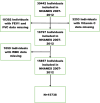Dietary Vitamin C Intake Affects Lung Function Through White Blood Cell
- PMID: 40370419
- PMCID: PMC12076004
- DOI: 10.1002/fsn3.70299
Dietary Vitamin C Intake Affects Lung Function Through White Blood Cell
Abstract
As an antioxidant, vitamin C has been increasingly used in the treatment of various pulmonary diseases in recent years. However, the mechanism by which vitamin C affects lung function remains unclear to this day. Given its low cost and low risk, vitamin C is highly suitable for widespread use as a conventional treatment, making research into its mechanisms of influencing lung function necessary. Considering the potential association between vitamin C and white blood cells (WBCs), it may influence lung function by affecting white blood count (WBC). The potential impacts of WBCs on the lungs may include damage to the lung parenchyma through proteases released by these cells, as well as the effects of inflammatory factors on alveolar epithelial cells, among other mechanisms. This study aims to explore the potential relationship between dietary vitamin C intake, WBC, and lung function through a cross-sectional study. This cross-sectional study included data from 15,738 participants in the National Health and Nutrition Examination Survey (NHANES) from three time periods: 2007-2008, 2009-2010, and 2011-2012. Parallel mediation analysis was conducted using a multivariable logistic regression model to assess the relationships between dietary vitamin C intake, WBC, and lung function. Following the cross-sectional study, we further incorporated Mendelian randomization (MR) analysis to strengthen the validity of the findings. The results of this cross-sectional study showed that dietary vitamin C intake was negatively associated with WBC (p < 0.05, β < 0), while WBC was also negatively associated with lung function. In contrast, dietary vitamin C intake was positively associated with lung function, with a significant positive mediation effect (p < 0.05, β > 0). These findings suggest that vitamin C may influence lung function by modulating WBC levels. The study may reveal part of the mechanism through which vitamin C affects lung function, specifically through the mediation of WBC. The roles of inflammation and proteases could be potential underlying mechanisms. However, further research is required to clarify the biochemical mechanisms. This study provides a reference for the clinical use of vitamin C in the treatment of related pulmonary diseases and promotes further research into its broader effects.
Keywords: FEV1; FVC; WBC; cross‐sectional study; vitamin C.
© 2025 The Author(s). Food Science & Nutrition published by Wiley Periodicals LLC.
Conflict of interest statement
The authors declare no conflicts of interest.
Figures
Similar articles
-
Circulating white blood cells and lung function impairment: the observational studies and Mendelian randomization analysis.Ann Med. 2021 Dec;53(1):1118-1128. doi: 10.1080/07853890.2021.1948603. Ann Med. 2021. PMID: 34259107 Free PMC article.
-
Diet and obstructive lung diseases.Epidemiol Rev. 2001;23(2):268-87. doi: 10.1093/oxfordjournals.epirev.a000806. Epidemiol Rev. 2001. PMID: 12192737 Review.
-
Association between dietary choline intake and asthma and pulmonary inflammation and lung function: NHANES analysis 2009-2018.J Health Popul Nutr. 2024 Sep 9;43(1):143. doi: 10.1186/s41043-024-00635-y. J Health Popul Nutr. 2024. PMID: 39252146 Free PMC article.
-
Dietary riboflavin (vitamin B2) intake and osteoporosis in U.S. female adults: unveiling of association and exploration of potential molecular mechanisms.Nutr J. 2025 Apr 7;24(1):53. doi: 10.1186/s12937-025-01103-x. Nutr J. 2025. PMID: 40189526 Free PMC article.
-
Dietary glycation compounds - implications for human health.Crit Rev Toxicol. 2024 Sep;54(8):485-617. doi: 10.1080/10408444.2024.2362985. Epub 2024 Aug 16. Crit Rev Toxicol. 2024. PMID: 39150724
References
-
- Anderson, R. 1982. “Effects of Ascorbate on Normal and Abnormal Leucocyte Functions.” International Journal for Vitamin and Nutrition Research. Supplement 23: 23–34. - PubMed
-
- Bergsten, P. , Amitai G., Kehrl J., et al. 1990. “Millimolar Concentrations of Ascorbic Acid in Purified Human Mononuclear Leukocytes. Depletion and Reaccumulation.” Journal of Biological Chemistry 265, no. 5: 2584–2587. - PubMed
LinkOut - more resources
Full Text Sources
Research Materials




